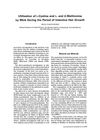Inhibitory Effects of Ethionine, an Analogue of Methionine, on Wool Growth
January 1982
in “
Australian journal of biological sciences
”
TLDR Ethionine significantly inhibits wool growth in sheep but not hair growth in mice or rats.
The study investigated the effects of ethionine, a methionine analogue, on wool growth in sheep and hair growth in mice and rats. Sheep received varying amounts of DL-, L-, or D-ethionine either through continuous infusion over 2 days or a single injection. Sucking mice and rats in their first hair growth cycle were given subcutaneous injections of DL-ethionine at different doses. The results indicated that ethionine inhibited wool growth in sheep and hair growth in mice and rats, demonstrating its potential as a growth inhibitor in these species.



